By Caroline Odera, Founder and Executive Director of Women in Sustainable Development (WISE), and Ferdinand Wafula, Founder and Executive Director of Bio Gardening Innovations (Western Kenya)
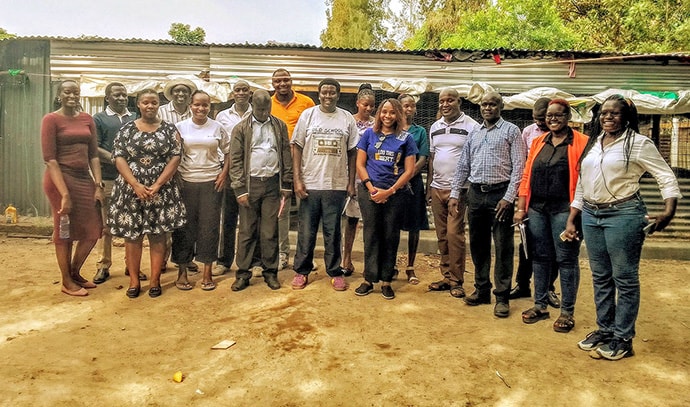
ELAF gathering 2024. Photo: WISE
We hosted this year’s East Africa Leaders Forum for current and past Pangea Giving grantees.
The two-day convention brought together organizations from East Africa for organizational running experience sharing, network building, challenges experienced and strategies on new ideas aimed at serving the communities better. The convention was culminated with visits to various WISE beneficiaries and projects implemented by one of the partners, Bio Gardening Innovation (BIOGI). The visits were interactive and we believe as partners we had a lot to take home in terms of knowledge and ideas to help us make our organizations sustainable emanating from the theme: Sustaining the gains as we serve our communities.
WISE HUB
With the constant look for inspirations, facts and statements that inspire us, surprise us and motivate us, the first day kicked off at WISE with sessions inclusive of sharing the challenges faced, expectations of individuals from the gathering, recommendations, and finally field visits. A presentation of the WISE profile was done by Sharon Adhiambo-Head of programs at WISE and members got to give their reviews on our work. After the presentation, there was a tea break with another session of networking that followed. Here people addressed the funding challenge and some of the expectations that they had for the gathering. This was an interactive session as a lot of vital information was shared. Another deserved break was the lunch period that was had at the beach and later we proceeded to the field visits to two WISE beneficiaries.
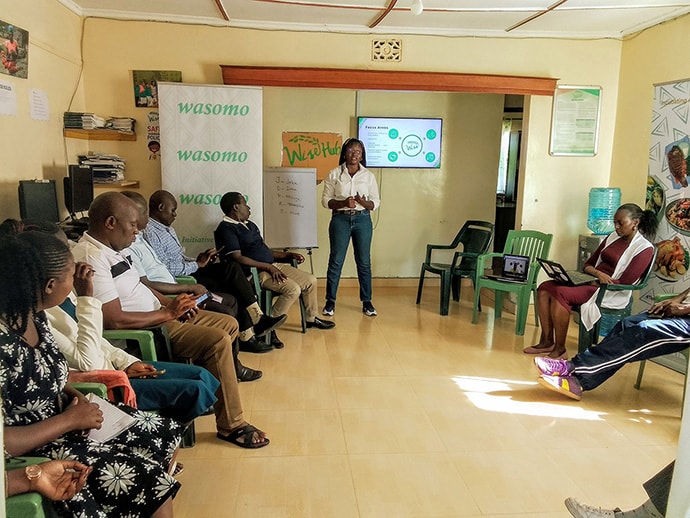
Sharon Adhiambo – Head of Programs at WISE; ELAF gathering 2024. Photo: ELAF
The first visit was to Nephil of Eko-kudd Limited. Nephil is a farmer of black soldier flies (BSF) alongside rearing chicken. We visited her premises where she does her business as well. The reception was good and the interaction which was also full of learning was informative. She took us through her business, how she came to know WISE, and the benefits that came with that. Nephil recently won an award of 10,000 USD and she explained to us how she has been able to use the fund to expand her business.
The next visit was to Artisanna who is a culturepreneur. She equally gave us a warm welcome and entertained us with her music and traditional artifacts. The performance was greatly enjoyed as people stood up to join in a dance filled with all forms of laughter and video recording. We had an opportunity to learn from her as well, as what she does is unique and one would often wonder why she does it and if it is profitable enough, not forgetting her journey with WISE. The day ended beautifully with us visiting the lake and enjoyed the sun setting as people continued to network over drinks followed by dinner and called it a day.
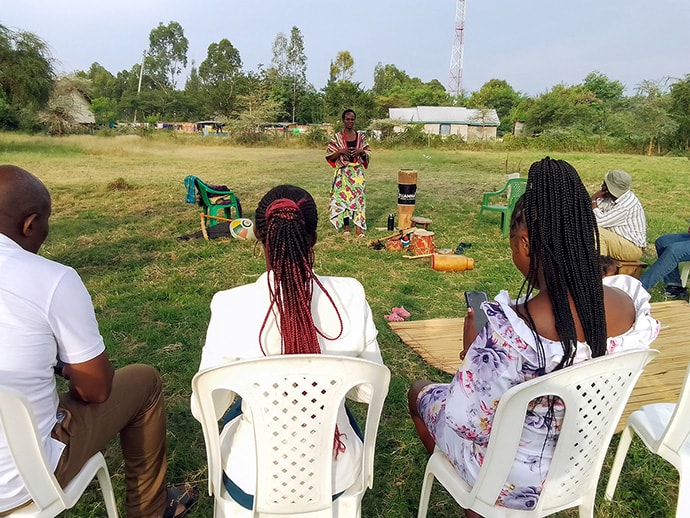
Artisanna, who is a culturepreneur, gave ELAF members a warm welcome and entertained with her music and traditional artifacts. Photo: ELAF
BIOGI
On day two the partners visited Bio Gardening Innovations in Vihiga. The journey from Kisumu was smooth with Ferdinand’s guidance, who welcomed us to the place and introduced his able team on arrival—the day carried on well with getting information about BIOGI, including field visits. Ferdinand explained their main concern areas are food systems, energy, and shelter systems for the community that they serve. This was seen the moment we stepped out to have a look around and see what they do. The team was impressed to learn that BIOGI uses solar systems for everything and only a small percentage of electricity when needed. Their ambition of building resilience and improving livelihoods has seen them create a habitat for nature by planting lots of vegetation. We had an opportunity to see the various kinds of seeds that, interestingly, they do not sell but get to exchange with the farmers in their purview. Different fruits and vegetables such as avocado, pawpaw, and managu were also evident on the farm, and the use of smaller spaces to do farming also caught our attention.
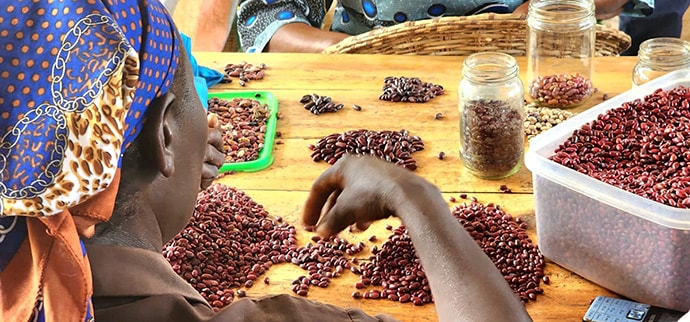
BIOGI seeds. Photo: ELAF
BIOGI has a well-designed system that responds to how nature operates. They have also used natural materials for construction including clay, sand, and straw. We enjoyed meals which were explained to be 70% from BIOGI and the farmers around. Ferdinand and the team also rear animals like rabbits, ducks, dairy goats, and a fish farm.
CHALLENGES
How might we leverage existing social capital to address inconsistencies in donor funding and achieve practical sustainability models in our organizations?
The question above posed as the main challenging agenda that cut across the different organizations. This led to an array of expectations from members that needed to be looked into. The expectations variedly summed up to:
- Interactive learning on sustainability models
- How to use urban approach in rural set-ups
- Learn and acquire skills from other organizations
- Incorporating IT in the organizations
- Building partnerships and collaborations with each other
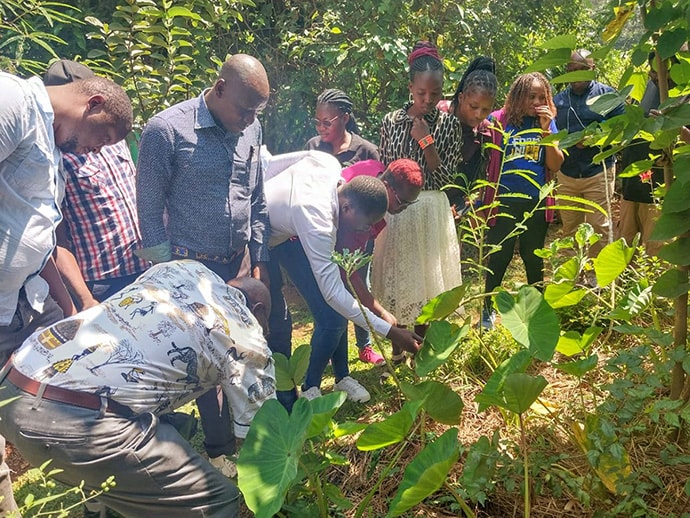
Site visit. Photo: ELAF
ACHIEVEMENTS
Having shared the major setback faced by the organizations, it was fulfilling to realize that however challenging it is, the organizations did not trample. Successful people are not gifted; they just work hard, then succeed on purpose. Testimonies of different organizations making substantial growth and accomplishing significant milestones are as summarized below:
Ewangan CBO: According to the recently released Kenya Demographic & Health Survey (KDHS), the prevalence of FGM is 15% in the country, meaning that 15% of girls and women aged 15 to 49 have been circumcised. Ewangan CBO With their Boresha Maisha Initiative, have been able to tackle 58% of matters to do with Female Genital Mutilation which is still a major concern in Narok despite attempts to deal with the issue as a country.
Child Empowerment Programme (CEP) Uganda: The nucleus of CEP being supporting education and community development has seen them successfully buy welding machines to make more beds for their beneficiaries and as at now even without their funding, the school can now run on a day-to-day basis on its own.
Ufanisi Women Group: From their impressive healthy and nutritious sweet potato bread and mandazis among other healthy palatable, they have been able to grow to owning a bakery which has been of great value addition.
CIFORD Kenya: With technological advancements taking the center stage of everything that we do, Evans of CIFORD Kenya shared a platform known as Tech Sup Kenya that offers free services like canva and webinars. Additionally there are forms of funding in kind by using free ads in google to promote the organization online as long as you have the .org domain.
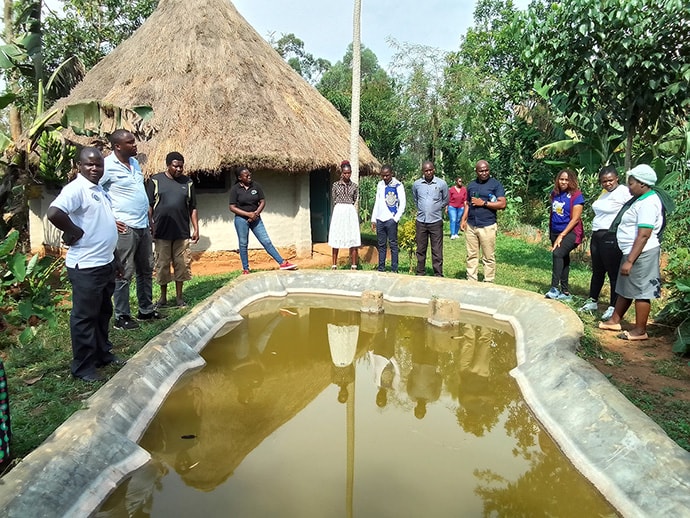
Site visit. Photo: ELAF
RECOMMENDATIONS
An analogy of an eagle as a bird that trains its children to survive was used to bring the idea of how to survive without a donor. Donors here are to be seen as people pushing you from the back. The first grant should be able to get you moving. You have to fly, create a model and have a visibility. Having said this, it is vital to consider some of these recommendations from the members:
-
Let people know what you are doing.
This was suggested in regard to how the organizations make use of their social media handles. Digital Communication takes many forms and has become the communication standard for individuals and organizations over time. In the workplace, digital employee communications speed up the flow of information and enhance team collaboration.
Social media is changing the way we communicate and the way we are perceived, both positively and negatively, depends on what impact you want to create out there. Every time you post a photo or update your status you contribute to your own digital footprint and brand.
-
Consistency in programming
Consistency is said to build momentum and being consistent at what you do gives you identity. Your conduct and activities should align with the organization’s mission so as to create impact to the public and even to donors. It was agreed that over time the efforts become more productive and efficient and the progress accelerates to sustainability.
-
Promoting economic status
This was suggested to be of value through teaching skills like farming, and not just farming of any kind but new technology farming. BIOGI practices this and provides alternative sources of livelihood. They use permaculture principles for their designs and implement them based on feedback and redesign when necessary. Another learning that fascinated people was that a small space could be utilized to achieve diversified farm produce
-
Introduce an online M&E Platform
This was suggested to ease reporting and communication within the team. An M&E tool can be designed by any member who is well conversant with the features. Here people would be able to fill the document online and even share pictures and videos.
-
Referrals from Pangea GlobalWA to other networks and platforms
Another recommendation that stood out was the idea of Pangea GlobalWA referring the organizations to their networks and Platforms that are relevant and would be interested to fund them. Aside from this, Pangea could also consider supporting enterprises that the team work with instead of looking for other organizations to fund.
- The Partners agreed to begin fundraising as a network, as EALF network, since each organization is solving a unique challenge. Therefore, members implored Pangea-GlobalWA to refer the network to other consortiums or network funders looking to invest bigger funding for bigger impacts.
- A recommendation to Pangea GlobalWA to start an initiative to recognize previous organizations that have scaled or made significant impacts as ”Pangea Global Impact Leaders” or any other name as appropriate. This will be based on applications, nominations or voting across the Pangea Global WA stakeholders and community.
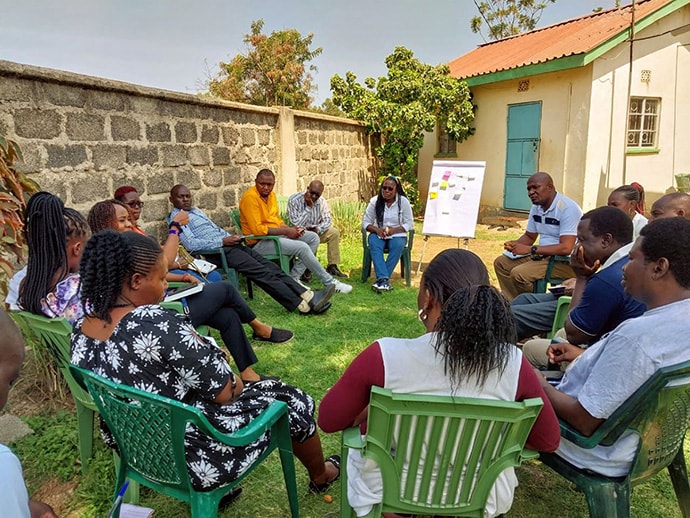
ELAF members continue their discussions outdoors. Photo: ELAF
CONCLUSION
A clear reflection was depicted of what is happening at the organizations in the field. The implementation on the ground is done efficiently. The healthy food, healthy living concept at BIOGI was widely embraced by the team. In order to maintain balance and control, social entrepreneurship is key for the stability of the organizations.
Assessing employee capabilities also stood out as it is convenient to design their responsibilities from that and to involve them more, for instance an example given was allowing employees to contribute in fundraising by writing proposals and giving them opportunities to attend important and relevant conferences for knowledge increase in a bid to evade the founders syndrome. Coping mechanisms shared such as having own funding projects to deal with challenges like the funding fluctuation was also informative.
Additionally, time seemed to be really short and a proposal for more time for the next gathering was considered to be three days instead of two so as to have time for networking. The next visit was agreed by majority to be in Uganda.
Lastly, we celebrated Joshua’s birthday of Common Ground as the highlight of the partners gathering. Among his wishes was the EALF Network fundraising to be 120,000 USD, which translates to approximately 10,000 USD per organization.